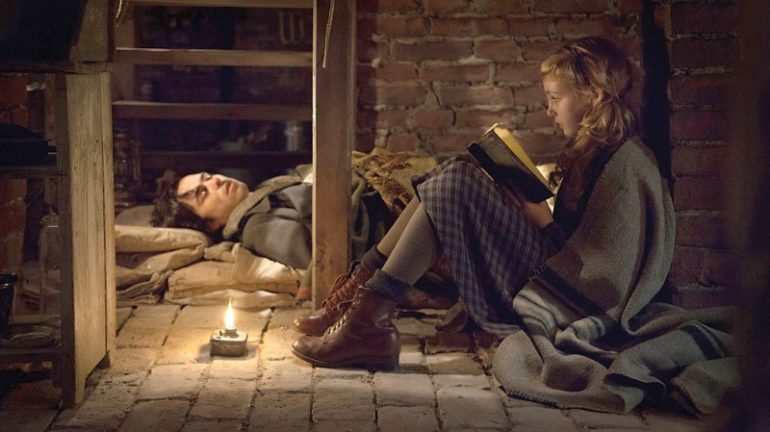[quote]“Art is a lie that makes us realize truth.” – Pablo Picasso[/quote]”
[quote]
“If you do a film about the Holocaust, you’re guaranteed an Oscar […] Schindler’s bloody List. The Pianist. Oscars coming out their arses.” – Kate Winslet, Extras[/quote]
All art, film included, has a responsibility towards history. Art can manipulate and distort history, where and when perceived as necessary, to shine a light on the past. Picasso painted the swirling dervish of chaos that is ‘Guernica’ to reflect the horrors of war. The makers of The Book Thief simply have an eye on awards and easy marketability. It is a hollow shell of a film, constructed of coloured artificial blandness to hide a distinct lack of a soul. It is engineered purely to manufacture false sentiment. Despite its ineptitude, its horrid deforming of history means it is not just a bad (poorly made) film. It is a BAD film, of questionable moral fibre. In an ideal world The Book Thief would suffer the fate of many a poor book in the film, and be burned on a pyre.
The problems begin right at the start, when our mysterious narrator (voiced by Roger Allam) begins to tell the tale. Fans of Markus Zusak’s source novel will know who he is, but it’s a silly structural gambit that should have been left with the book. His voiceover introduces us to Liesel Meminger, a young girl who is adopted by foster parents after the disappearance of her communist parents. Liesel is played by young French Canadian actress Sophie Nélisse, who it seems was cast based on her Bambi eyes. Her round face and big brown peepers look custom made for a weepie. Be assured; she will deliver pouty, cutesy crying of the highest order. Her foster parents are played by Geoffrey Rush and Emily Watson, wasting their talents on ‘kindly old pop’ and ‘bitter realist mother’ roles respectively. Liesel is lonely, but begins making new friends and living a weakly-acted and idyllically photographed life. Her foster father begins to teach Liesel how to read, and thus is ingrained a love of the written word. So strong is this love that she begins saving books from burnings. It feels like a dumbed-down history lesson. Replace Jews with books, see? Good grief; it’s as if Shoah never happened.
As people start hanging swastika flags from their windows and Liesel and her friends are roped into the Hitler Youth, the clouds of war drift in. However, there’s little sense of threat or urgency. To counter this, a young Jewish man named Max (Ben Schnetzer) is roped in as a dramatic device. Liesel’s father must hide Max to repay an old debt; thus, the story is given a forced dramatic device and Liesel gains an oracle, spouting wisdoms and aiding her with her reading lessons. It’s all horribly trite; considering how many incredible survival stories are known from this time, surely telling one of them would have been much more worthwhile? Instead we get a forced episodic tale, with army conscription, air raids, atypically friendly Nazis and a plot development in the later stages which doesn’t so much tug at the heartstrings as rip them out with a Panzer. All this and the creepy narrator add up to a pile of patronising, middle-of-the-road awards bait. Ultimately, The Book Thief’s only Oscar nomination is for John Williams’ pretty score which, unlike the rest of the film, sidesteps WWII film clichés. Someone call Jerry Lewis; The Day The Clown Cried couldn’t be as bad as this, surely?
[yframe url=’http://www.youtube.com/watch?v=92EBSmxinus’]

